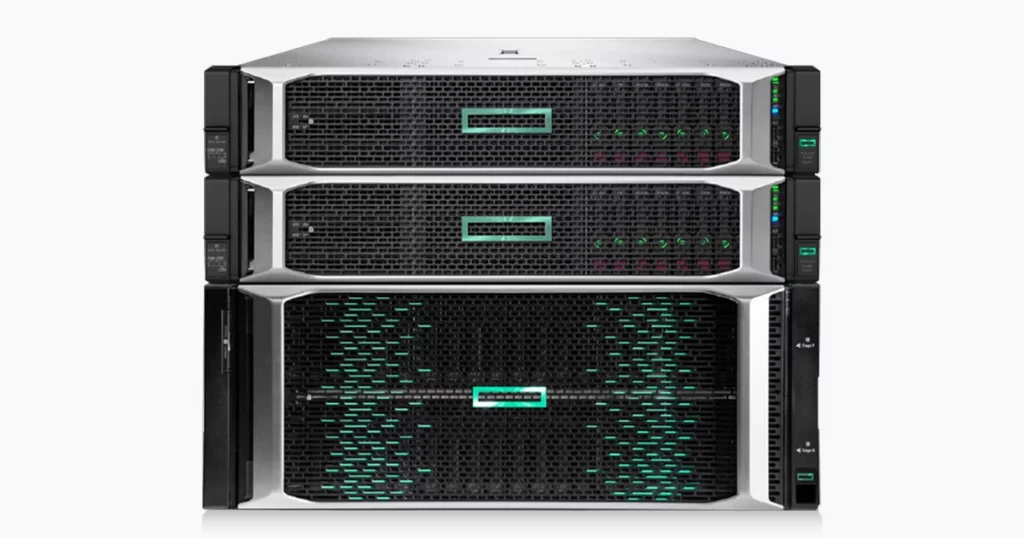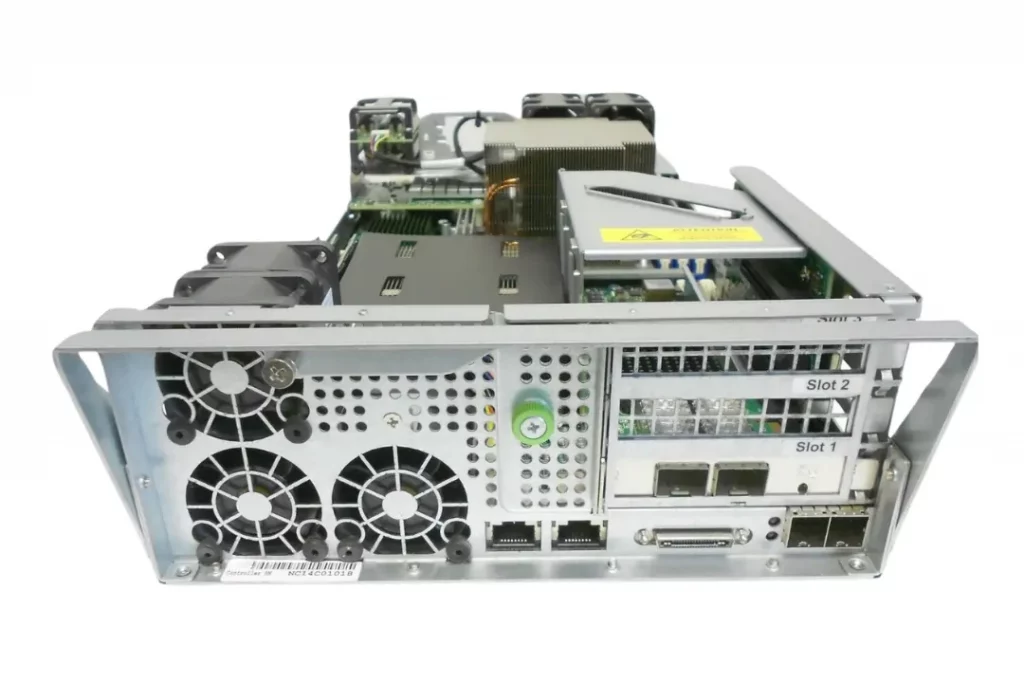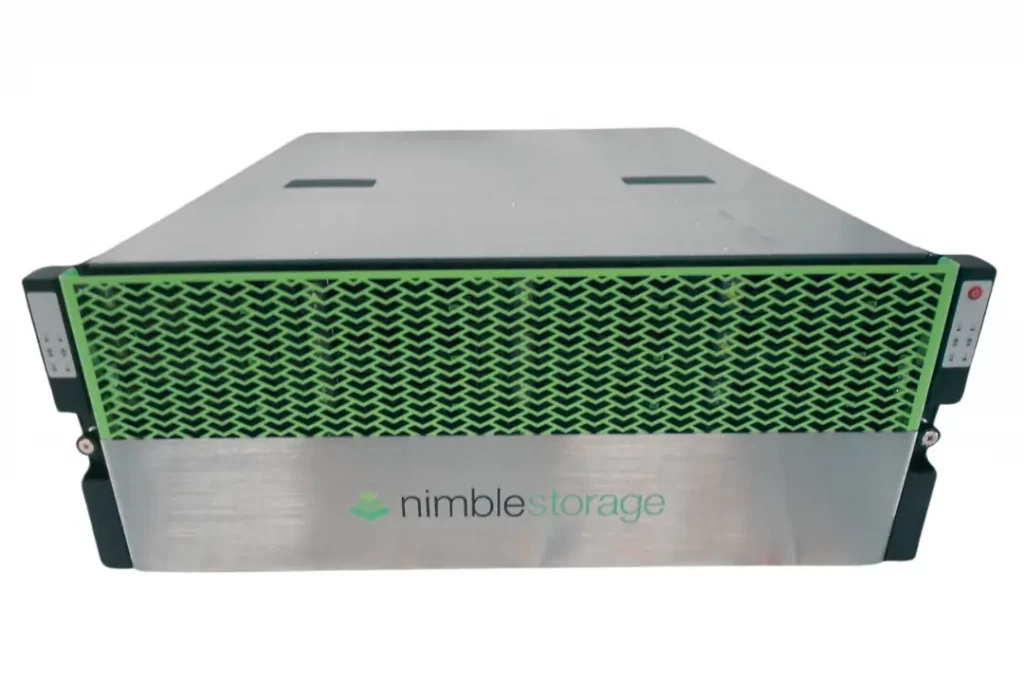When an enterprise storage system collapses, business continuity is instantly at risk.
In this case, our engineers successfully performed a complex HPE Nimble Storage data recovery, rescuing over 90TB of Veeam backup data from a severely corrupted hybrid storage environment.
Critical Incident Overview
A corporate client contacted our data recovery team following a major system crash that rendered their HPE Nimble Storage and Windows Server 2016 environment inoperable.
Improper write operations during the crash caused extensive corruption within the ReFS file system, making crucial Veeam backup data inaccessible and halting mission-critical operations.
With no time to spare, the client shipped the affected unit to our laboratory for immediate analysis and emergency recovery.

Technical Diagnosis
Our engineers initiated a structured diagnostic procedure. The affected environment consisted of HPE Nimble Storage configured with iSCSI volumes, HP SAS drives for data storage, and SSDs for caching. Deduplication was enabled, adding complexity to the storage structure.
Initial hardware inspection confirmed that all drives were physically intact. The real problem lay within the corrupted ReFS metadata, which disrupted logical access to all stored data. This corruption was so severe that both the operating system and the storage volumes failed to mount properly.
Key Recovery Challenges
ReFS Metadata Corruption: Extensive corruption of the ReFS structure prevented directory mapping and file access.
Deduplication Complications: HPE Nimble’s deduplication introduced additional reconstruction challenges.
System Instability: The Windows Server crash disrupted metadata writes and caused cross-volume inconsistencies.
Each of these variables demanded a precision-engineered recovery process capable of reconstructing both the logical file system and the deduplicated data patterns.
Our Recovery Approach
Our methodology followed a multi-layered framework designed for enterprise-scale failures:
Every HP SAS and SSD component was thoroughly examined for physical degradation, SMART errors, and read anomalies.
Once confirmed stable, we created bit-level forensic images of all drives to work from safe replicas.
Using advanced recovery tools tailored for ReFS, our team rebuilt the damaged file system metadata from scratch.
We mapped out fragmented sectors, repaired corrupted index nodes, and restored missing allocation data.
This process leveraged the intrinsic resilience mechanisms within ReFS to reestablish structural integrity.
Because deduplication alters how data blocks are stored, recovering usable files required decoding these relationships.
Our engineers utilized specialized algorithms to reconstruct original files from the deduplicated data pool without compromising consistency or content accuracy.
After logical reconstruction, we focused on Veeam backup recovery, extracting approximately 90TB of usable data from the 120TB array.
The extraction required navigating through complex, fragmented structures while preserving data reliability.
Finally, our engineers restored Windows Server 2016 to a stable operational state, verified all extracted data through checksum validation, and re-integrated the recovered backups into the client’s HPE Nimble environment.

Fast turnaround times for business-critical data
Results
Recovered Data Volume: 90TB of Veeam backup data
Recovery Rate: 98%+
Turnaround Time: Emergency service completed within days
System Restored: HPE Nimble array and Windows Server environment fully operational
The client’s business operations resumed with minimal downtime, validating the success of our structured and methodical approach.

Engineering Insights
This case demonstrates several realities of enterprise data management:
ReFS resilience has limits: While ReFS offers integrity protection, it cannot self-heal after severe metadata corruption.
Deduplication complicates recovery: Systems with deduplication require specialized mapping reconstruction to restore data accurately.
Emergency response speed matters: Immediate professional assessment drastically increases recovery success rates.
Our engineers’ deep understanding of hybrid storage technologies and file system architecture was instrumental in achieving full data recovery.
Why Expertise Matters in HPE Nimble Storage Data Recovery
HPE Nimble Storage is a high-performance system designed for efficiency — but when failure occurs, standard recovery tools are inadequate.
Our lab maintains proprietary toolsets and imaging protocols for Nimble hybrid flash arrays, enabling full recovery from cases involving:
RAID parity loss or controller failure
ReFS or NTFS corruption
Firmware damage
Deduplication inconsistencies
OS-level crashes or misconfigured iSCSI links
Our expertise allows enterprises to regain access to critical workloads faster and safer than in-house recovery attempts.

Final Outcome
Through methodical engineering and proprietary technology, our specialists achieved full logical restoration of the HPE Nimble environment.
The Veeam backups, which form the backbone of the client’s disaster recovery infrastructure, were fully operational again, reinforcing our commitment to data integrity and business continuity.
Need Professional Assistance?
If you are experiencing failure in your HPE Nimble Storage, SAN, or enterprise RAID systems, immediate action is critical.
Avoid reinitializing or reconfiguring the array, it can permanently overwrite recoverable data.
Contact RAID Recovery Services today for rapid, professional, and secure HPE Nimble Storage data recovery.
Trust the experts with proven results
Frequently Asked Questions
Can data be recovered from a failed HPE Nimble Storage array?
Yes. Even after severe hardware or file system failure, our engineers can recover data by reconstructing logical structures from the Nimble array. Each drive is imaged, analyzed, and rebuilt in a controlled lab environment using proprietary recovery tools.
What are the common causes of HPE Nimble Storage failure?
Failures often stem from improper shutdowns, controller malfunctions, firmware errors, or corruption within ReFS or deduplication layers. In some cases, system-level crashes lead to incomplete write operations that damage metadata.
Is it possible to recover deduplicated data from Nimble Storage?
Yes, but deduplicated data recovery requires deep technical expertise. Our specialists decode and reconstruct deduplication mappings to restore original files with full integrity.
How long does enterprise-scale HPE Nimble data recovery take?
Timeframes vary by capacity and damage level. Emergency recoveries typically complete within several days, while full-scale projects can take longer depending on the severity of the corruption.
Can I attempt to repair a failed Nimble array myself?
No. Self-repair attempts can overwrite recoverable data, reducing recovery success rates. It’s essential to power down the array immediately and contact a professional data recovery provider.